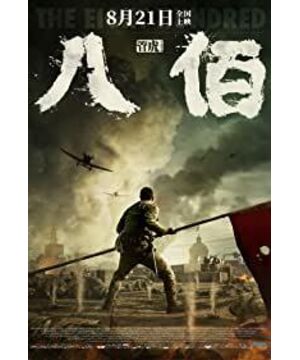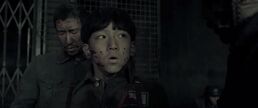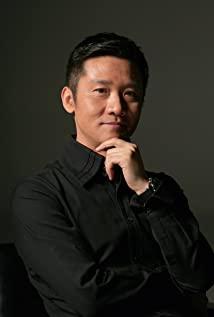The screening room watched this long-rumored film, because of the tragic experience of the film itself, the film company behind it that was struggling with life and death, and the recognition of the completion of the director's previous work "Old Pao'er". Looking forward to the movie itself. But after reading it, it must be said that I am more disappointed.
"Reforms in all countries are all made of blood. Today, there is no one who bleeds because of reforms in China. The reason why this country is not prosperous. If there is, please start with the same heir!"
The core theme of the film is basically this.
If you look at this movie as an action movie in which the protagonist destroys the enemy in order to achieve his purpose, the story of the four-line warehouse itself is extremely flawed. Because it had a great assumption from the beginning, the Japanese army could not use heavy weapons so that the two sides could fight relatively fairly, and the National Government did not intend to win, but regarded it as a "show" to seek international support , so no matter how heroic these 400 people are, the final outcome has long been determined, and the historical outcome is that most of the people are evacuated, and it is impossible to fabricate the heroic scene of all the soldiers sacrificed for the country. All in all, the story itself is bad and not cool enough.
In order to solve this problem, the creators give meaning to the actions of the protagonists from the perspective of enlightening people's wisdom. Although they lost, although they retreated undeservedly, although what they did was actually just a show from the perspective of their superiors, but Their actions inspired all the people to fight the enemy together. It must be said that this strategy is completely correct and works. However, the film has problems in the process of implementing this strategy.
The biggest problem with this movie is that the action of the characters is too far from the goal. "Inspiring people's wisdom" is a very imaginary goal. We must make great efforts to make it a reality. The movie takes the people in the concession on the other side of the river as the representatives of the masses. How they were spectators from the beginning, and then awakened after witnessing the tragic death of the eight hundred warriors, and became a close-up of the hands at the end of the film. However, the film did not portray any of the people as the main characters. We only saw that all kinds of people finally awakened, but we did not see the process of their psychological changes, and more importantly, their psychological changes and warriors One-to-one correspondence between the struggles. The only major public representative is the reporter, but the reporter's psychological portrayal is not much rich.
Thus, the action of the warehouse defenders lost its target. The film frantically shows us how tragic the soldiers died, but it doesn't explain to us why they are so tragic. For example, the part about protecting the flag has no practical tactical significance. It is that the regiment leader used the soldiers' lives as a show. For example, at the end, Li Chen, Wang Qianyuan, and the others took the initiative to go out to die. What actual cover did they play? Can't you just stay in the warehouse for cover? In fact, these actions can all be made up for reasons, but the creators didn't do it. Anyway, it can be attributed to the fact that they used their own sacrifices to inspire the wisdom of the people. The only moving soldier's sacrifice in the film is Zheng Kai's death, because his death has practical significance. If he doesn't do it, the wall of the warehouse will be blown up by the Japanese army, and they will lose. This is us. As the logic that the audience can understand and agree with, the soldiers behind them lined up to jump off the building, and the people were touched when they saw them lining up to jump off the building.
However, most of the sacrifices in the film lack such practical reasons, and the director frantically exaggerates their sacrifice under the banner of "inspiring people's wisdom", which makes the film form a kind of "masochistic aesthetics" Effect. In pursuit of artistic effect, the film abuses the protagonist illogically, and then uses audiovisuals to extremely beautify the abuse of the protagonist, as if the abuse itself is the meaning.
When "Wolf Warrior 2" was released, a film critic said from the media that there was a sadistic tendency in this film, and the protagonist constantly destroys the opponent's body to show the masculine charm, and "Eight Hundred" can be said to do the opposite. First of all, it expresses masculinity by showing that the body of the protagonist is constantly being destroyed.
Interestingly, in traditional movies, the target of this kind of abuse is usually women, such as a large number of B-level movies, and in mainstream movies, the heroic rescue of beauty must have the content of beautiful women being caught and humiliated by bad guys. This sadism of women unleashes the sexual desires of creators and viewers. However, this film uses sadism on the male protagonist. Considering that the actors in the film are basically handsome guys, catering to the needs of female audiences, men have become the objects to be watched, which just shows the strength of men. Decline, this is really contrary to the original purpose of this film to create the charm of Chinese men.
In addition, the director was lost in the accumulation of a large number of artistic symbols in the film, and even sacrificed the narrative rhythm for this. It was already very procrastinating just by running the horse for so long, and he had to let Ou Hao play Zhao Yun? ? ? This is a far cry from the proper use of ostriches in "Old Pao'er".
Interestingly, the experience of the film itself has also become a portrayal of masochistic aesthetics. We first saw it being suppressed, and then stood up to save the market against the background of the bleak market. The audience watched it being abused again and again. It inspired a huge amount of compassion, and I hope this compassion can really bring about a huge amount of feedback from the public like the end of the film.
PS: How much sponsorship was received from Coca-Cola for this film... Even if this was the real situation at the time, that trademark appeared too many times. Especially the CG shot at the end of the film comparing ancient and modern, here it is completely possible to deliberately violate historical events and not put the trademark on it. The director hopes that the audience will be moved by seeing the sacrifice of the martyrs in exchange for today's prosperity, but in fact, all my eyes are full of That big red Coca-Cola...
View more about The Eight Hundred reviews











